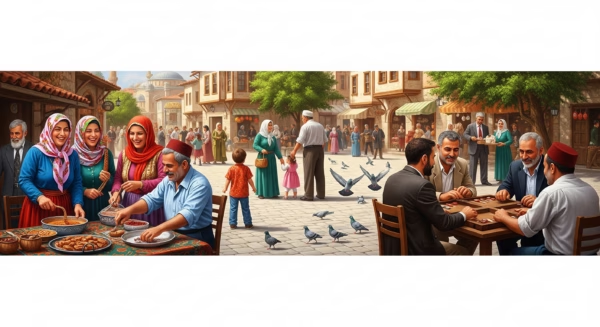
Expats in Turkey
Expats in Turkey: The Ultimate Guide to Life, Living and Everything In Between
So, you’re thinking about moving to Turkey? Or maybe you’ve already arrived, sipping Turkish tea on a sun-drenched terrace, wondering how to get your residence permit before your tourist visa runs out. Either way, welcome! This guide is for anyone considering life in Turkey as an expat — whether you’re a remote worker, retiree, adventure-seeker, or serial escapee from grey weather.
Turkey has quickly become one of the most appealing destinations for expats around the world, and it’s not hard to see why. A unique blend of East and West, ancient and modern, chaotic and serene, Turkey manages to offer something for everyone. Let’s dive into everything you need to know about being an expat in Turkey.
Why Turkey? The Allure Explained
Climate and Nature
Turkey stretches across two continents and offers an astonishing range of climates and landscapes. Along the Aegean and Mediterranean coasts, you’ll find long summers, mild winters, and endless sunshine — perfect for beach lovers, retirees, or anyone tired of grey skies. Inland, the Anatolian plateau brings drier seasons and snowy winters, which appeal to those who love a seasonal shift. Want to ski in the morning and swim in the afternoon? Yes, you can do that here.
Turkey also boasts some of the most dramatic landscapes in the region: the surreal rock formations of Cappadocia, pine-covered mountains of the Black Sea, white travertine terraces of Pamukkale, and turquoise beaches of Kaş. For nature lovers, hikers, and photographers, it’s paradise. Expats often say that even after years of living in Turkey, they’re still discovering breathtaking places they’d never seen before.
Cost of Living
Turkey’s affordability is one of its biggest attractions. Many expats come here for a holiday and quickly realize they could live here for a fraction of what they spend at home. Rents are affordable, especially outside of central Istanbul. Dining out? A full meal with drinks might cost less than a coffee and sandwich in London. Fresh fruits, vegetables, and meats are widely available at weekly markets and cost just a few lira.
Of course, inflation and currency fluctuations have made budgeting more important in recent years. Still, for expats earning in dollars or euros, the cost of living remains significantly lower than in most Western countries. It’s no wonder so many retirees, remote workers, and adventure seekers choose to stretch their income further here.
Cultural Diversity and Everyday Adventure
Life in Turkey is rarely boring. As a true cultural crossroads, the country offers layers of history, religion, tradition, and modern life all woven together. One minute you’re walking past Roman ruins, the next you’re in a contemporary art museum, and then having dinner in a restaurant housed in a centuries-old Ottoman mansion.
Festivals, local holidays, village markets, call to prayer echoing across city skylines — it’s all part of the rhythm. Even mundane tasks like buying bread can turn into a cross-cultural encounter. Living here means daily surprises, spontaneous conversations, and always learning something new. If you crave routine and predictability, Turkey might push your comfort zone — in the best possible way.
People and Hospitality
Turks are famously hospitable. That’s not just a stereotype; it’s a deeply ingrained cultural norm. As a guest or foreigner, you may be offered tea (çay) several times a day — by your neighbor, your landlord, even your local grocer. Saying no is tricky; saying yes often leads to real connection.
This hospitality creates strong social bonds. Many expats find themselves invited to weddings, family dinners, and celebrations within weeks of arriving. In smaller towns especially, it’s common for locals to ‘adopt’ foreign residents and help them navigate everything from the post office to power outages.
Geopolitical Position and Travel Access
Turkey’s position between Europe and Asia means it’s incredibly well-connected. For digital nomads or frequent travelers, this is a major perk. Quick flights connect Istanbul to nearly every major European and Middle Eastern city. Domestic travel is easy, with budget flights and extensive bus and train networks.
Living in Turkey doesn’t mean isolating yourself from the world — it often means being at the center of it.
A Sense of Freedom and Simplicity
Many expats describe a sense of “breathing space” in Turkey. There’s less pressure to be constantly productive, less red tape in some areas of life, and often a refreshing simplicity in day-to-day routines. While bureaucracy can be challenging (we’ll get to that later), life often feels more grounded and people-centered.
You’ll see neighbors chatting on doorsteps, families gathering in parks, and vendors calling out good-natured banter at the bazaar. It’s a slower pace, but richer — and for many, it’s exactly what they were missing.
Summary: Why So Many Expats Say Yes
- Excellent climate diversity
- Affordable living and healthcare
- Friendly, warm communities
- Deep cultural experiences
- Excellent regional and international travel access
- A refreshing perspective on life
It’s not just a place to move. For many, Turkey becomes a lifestyle — a space to slow down, engage more deeply, and rediscover joy in everyday moments.
Culture and People
Turks are known for their hospitality. You may walk into a shop and come out 30 minutes later having been offered tea, a snack, and a full family history. For many expats, the warmth of the people is the unexpected highlight.

Where Expats Live in Turkey
When it comes to choosing where to live, expats in Turkey have an abundance of options, each with its own personality, lifestyle, and pace. Whether you’re dreaming of a laid-back beach town, a buzzing metropolis, or something in between, there’s a corner of Turkey waiting to welcome you. Here’s a comprehensive look at the most popular destinations for expats in Turkey and why some places work better than others.
Istanbul
If you’re the kind of expat who thrives on culture, history, art, and nonstop energy, Istanbul may be your perfect match. As the largest city in Turkey and one of the most vibrant in the world, Istanbul offers a truly cosmopolitan experience.
- Lifestyle: Expect a fast-paced, urban lifestyle. Think coffee shops in restored Ottoman mansions, street musicians on Istiklal Avenue, and Sunday strolls through antique markets.
- Community: A large, diverse expat population makes it easier to find international schools, English-speaking services, and meetups.
- Housing: From modern high-rises in neighborhoods like Kadıköy and Levent to historic apartments in Beyoğlu or Cihangir, Istanbul’s real estate is as varied as the people who live there. Rents are higher than the national average but still affordable compared to Western cities.
- Traffic & Commute: Public transport is extensive but the traffic is infamous. Strategic neighborhood choice can make or break your daily routine.
Living in Istanbul gives you access to everything from fine dining to ancient monuments, but it can be overwhelming for those seeking peace and quiet.
Antalya Province (Especially Alanya)
On the opposite end of the spectrum is Antalya Province, where coastal living meets comfort. This area has seen explosive growth among expats in Turkey, and for good reason.
- Alanya: Alanya is arguably the most expat-friendly city in Turkey. With a large international community, you can find English-speaking services, property agents, and even entire neighborhoods where you’ll hear more Russian, German, or Scandinavian languages than Turkish.
- Climate & Lifestyle: Mediterranean climate means long summers and mild winters. Perfect for retirees, remote workers, and anyone seeking sunshine year-round.
- Cost of Living: Considerably more affordable than Istanbul. Rent and daily expenses are budget-friendly, yet services are modern.
- Real Estate: A wide range of options from beachfront apartments to mountain villas. Property prices are reasonable and foreign ownership is common.
- Safety & Simplicity: The pace is slower, and the atmosphere is welcoming. Many expats report feeling safer and more relaxed here than in larger cities.
Alanya is ideal for those looking to settle long-term with minimal stress. It’s one of the few places where the line between vacation and daily life is beautifully blurred.
Izmir
Located on the Aegean coast, Izmir offers a blend of progressiveness, coastal charm, and Turkish authenticity. It has a more understated vibe compared to Istanbul but maintains the infrastructure and convenience that expats in Turkey appreciate.
- Who it suits: Younger professionals, couples, and families who want a more relaxed, less touristy base.
- Culture & Feel: Izmir is known for its liberal attitudes, lively arts scene, and great food. There’s a sense of balance here that appeals to those who want culture without chaos.
- Neighborhoods: Alsancak and Karşıyaka are popular among expats. Both offer seafront living, walkability, and a great mix of local and international flair.
While it doesn’t have the global spotlight like Istanbul, Izmir is a rising star for expats in Turkey who want modernity with Mediterranean ease.
Other Coastal Towns: Fethiye, Bodrum, Marmaris
These towns are postcard-perfect, but they come with trade-offs.
- Fethiye: Stunning natural beauty and a tight-knit expat community. Great for sailing enthusiasts and nature lovers, but quieter in winter.
- Bodrum: Glamorous in summer, sleepy in winter. Popular with seasonal residents and property investors. Expensive.
- Marmaris: Affordable and picturesque but largely tourism-dependent. Services may be limited in the off-season.
While these towns offer a wonderful life for part of the year, the seasonal nature of the local economy and fluctuating population can be a challenge for full-time residents.
Lesser-Known Options
- Eskişehir: A student city with a lively vibe. Affordable and safe but lacks coastal charm.
- Ankara: The capital city. Great for government jobs or embassies, but not as expat-friendly or scenic.
- Trabzon & Black Sea Region: Lush and green but more conservative and rainy. Language barriers are more pronounced.
Choosing the Right Place as an Expat in Turkey
The best place for one expat may not be ideal for another. When deciding where to live in Turkey, ask yourself:
- Do I want a beach or a big city?
- Is nightlife or nature more important to me?
- Do I need international schools or work opportunities?
- How important is being near other expats?
Many expats in Turkey start in one city and move to another after discovering what suits their lifestyle best. Fortunately, with so many beautiful options, it’s hard to go wrong. Beautiful but seasonal. Great if you’re OK with quiet winters and lively summers. Infrastructure may vary.
Residency & Legal Basics
Visa & Residence Permit
For expats in Turkey, securing the right to stay long-term is one of the first essential steps. Turkey offers a relatively accessible process for foreigners, but it comes with its own quirks, paperwork, and (occasionally baffling) terminology.
Types of Residence Permits
There are several types of residence permits available, depending on your circumstances:
- Short-Term Residence Permit (Kısa Dönem İkamet İzni): Most common for new expats. Valid for up to 1 year, renewable annually. Suitable for property owners, digital nomads, retirees, or long-stay visitors.
- Family Residence Permit: For those married to Turkish citizens or who have Turkish children. Usually valid for up to 2 years.
- Student Residence Permit: For those studying at a recognized institution in Turkey.
- Long-Term Residence Permit: Available after 8 years of uninterrupted legal residency.
- Humanitarian and other specific permits: For refugees, asylum seekers, and other unique situations.
How to Apply for a Residence Permit
- Online Pre-Application: Go to the official website (https://e-ikamet.goc.gov.tr) and fill out the online form. Choose your appointment date and download the application form.
- Gather Your Documents:
- Biometric photos (in Turkish format)
- Valid passport (and notarized Turkish translation, if required)
- Proof of address (rental contract, title deed, or notarized declaration)
- Health insurance valid in Turkey (required unless you’re over 65)
- Proof of income or financial means (bank statements or pension info)
- Attend the Appointment (Randevu): Go to the local immigration office (Göç İdaresi) on your appointment date with all your documents.
- Wait for Approval: You’ll receive a temporary document while waiting for the official card, which usually arrives within a few weeks to a few months.
Tips for a Smooth Process
- Double-check document requirements in your province; they may vary.
- Arrive early for your appointment.
- Be patient — bureaucracy can be unpredictable.
- If you’re unsure, many cities have agents or legal assistants who can help with the process for a modest fee.
Renewing Your Permit
Renewal is usually straightforward if your situation hasn’t changed. Start your renewal 60 days before the expiration date. Keep your documents updated, especially your address registration.
Common Mistakes to Avoid
- Applying too late (you must apply before your visa or permit expires)
- Not registering your address with the Nüfus Müdürlüğü (civil registry)
- Overstaying your visa without applying for a residence permit
- Assuming English will be spoken at all offices — it usually isn’t
Address Registration
Once you get your residence permit, you must register your address with the local population directorate (Nüfus Müdürlüğü). This is mandatory and must be completed within 20 business days of receiving your permit. Bring your rental contract and your residence card.
Health Insurance
Health insurance is a critical component of your application. Options include:
- Private Turkish insurance (usually the cheapest, accepted by immigration)
- SGK (public health insurance): Available after 1 year of residence if you are employed or apply voluntarily
- International insurance: Accepted only if it meets Turkish coverage criteria
Make sure your insurance covers outpatient and inpatient care. Immigration authorities can reject your application if your policy isn’t comprehensive.
Tax Number (Vergi Numarası)
Almost every bureaucratic process requires a tax number. You can get one at any local tax office with your passport. It’s free and needed for:
- Opening a bank account
- Buying property
- Registering utilities
- Paying fees during your permit application
Buying Property
Buying property can significantly streamline your long-term stay. It qualifies you for a residence permit and, in some cases, even Turkish citizenship by investment.
Key Facts:
- Foreigners can buy property almost anywhere except military zones.
- Title deed (Tapu) process is straightforward but best handled with legal help.
- Property valued at $400,000 or more (plus meeting certain conditions) can make you eligible for citizenship.
- No Turkish citizenship needed to own land or an apartment.
Most expats buy in coastal regions like Alanya, Antalya, or Bodrum, where agents are familiar with foreign buyers and speak multiple languages.
Citizenship by Investment
If you’re looking to go all-in, Turkey offers a citizenship-by-investment program:
- Invest $400,000+ in real estate
- Hold the property for at least 3 years
- Apply with additional paperwork (background check, etc.)
The process takes 3–6 months and grants you a Turkish passport. It’s one of the faster citizenship routes in the world.
Digital Nomad Visa (New!)
As of 2024, Turkey launched a visa program for digital nomads, targeting remote workers aged 21–55 with a university degree and minimum annual income (~$36,000 USD). Eligible nationalities include EU, UK, USA, and several others. This visa provides a legal basis to work online while living in Turkey.
Buying property can make your residence application smoother and give you a place to call home. Foreigners can buy in most areas except military zones. The process is relatively straightforward and can even qualify you for long-term residency or citizenship (with investment).
Daily Life in Turkey
Daily life for expats in Turkey can be as vibrant or as relaxed as you want it to be. One of the greatest advantages of living in Turkey is how quickly you can find your rhythm — whether that means starting your mornings with fresh simit from the bakery, relaxing at a seaside café, or diving into the buzz of a local market. Here’s what everyday life truly looks like.
Language
Yes, you can survive in tourist-heavy areas with English alone, but if you want to thrive as an expat in Turkey, learning basic Turkish is invaluable. Even simple phrases like “merhaba” (hello), “teşekkür ederim” (thank you), and “ne kadar?” (how much?) go a long way in showing locals you’re making an effort.
Many expats take free or low-cost Turkish lessons offered by municipalities, language schools, or online platforms. While Turkish grammar can be tricky at first (agglutinative structure, anyone?), the pronunciation is logical and the locals are extremely encouraging.
Transportation
Getting around is efficient and inexpensive. In cities, public transportation includes metros, trams, buses, ferries, and the ever-popular dolmuş — a shared minibus that follows flexible routes. Payment systems like Istanbulkart (used in multiple cities) make commuting even easier.
If you’re living in rural areas or want more freedom to explore, renting or buying a car may be preferable. Be prepared though: driving in Turkey requires confidence, a good sense of humor, and quick reflexes. Traffic rules are often “suggestions.”
Healthcare
Turkey has both public (SGK) and private healthcare systems. Expats often choose private healthcare due to shorter wait times and English-speaking doctors. Cities like Istanbul, Izmir, and Antalya have modern hospitals with international accreditation. A specialist visit can cost as little as $20-$40.
Pharmacies (eczane) are ubiquitous and pharmacists are generally helpful, often offering over-the-counter advice. Emergency services (dial 112) are available but vary in efficiency depending on your region.
Food & Shopping
One of the pure joys of living in Turkey is the food. Markets overflow with seasonal produce, cheeses, herbs, spices, olives, and baked goods. Every neighborhood has a weekly street market where you can shop directly from farmers and producers at low prices.
Supermarkets like Migros, CarrefourSA, and BIM are common, but smaller local shops often have better prices on fresh goods. Shopping malls are popular and modern, with international and Turkish brands alike.
Dining out is affordable and delicious. From family-run kebab joints to trendy rooftop restaurants, eating out is a social affair. A full meal can cost as little as $5–10, and street food like lahmacun or simit is both tasty and budget-friendly.
Utilities and Services
Setting up electricity, water, and internet in your home typically requires a tax number, residence permit, and your rental agreement. Bills can be paid online or at PTT (post office) branches. Internet speeds are generally good in cities and towns, though rural areas may experience slower service.
Garbage is collected regularly, and recycling bins are increasingly common. Many buildings have a kapıcı (doorman or caretaker), who handles maintenance, trash, and small deliveries.
Pets and Veterinary Services
Turkey is pet-friendly, especially in coastal cities and among the expat community. Stray cats and dogs are well-treated and often fed by locals. If you have a pet, you’ll find good veterinary care at reasonable prices. Importing a pet requires paperwork and vaccinations but is very doable.
Religion and Holidays
Turkey is a secular state with a Muslim majority. You’ll hear the call to prayer five times a day, but religion is generally practiced privately. Respect during religious holidays like Ramadan and Kurban Bayram is appreciated.
Public holidays include Republic Day (Oct 29), Children’s Day (Apr 23), and Victory Day (Aug 30). On these days, many businesses close, and celebrations range from fireworks to parades.
Safety and Security
Turkey is generally safe for expats. Like any country, petty crime can occur in crowded areas, so take basic precautions. Most neighborhoods have a strong community feel, and violent crime is rare. Emergency numbers include:
- Police: 155
- Ambulance: 112
- Fire: 110
The presence of “Zabıta” (municipal police) ensures additional regulation and safety in marketplaces and tourist areas.
Work-Life Balance and Pacing
The Turkish lifestyle encourages socializing, family time, and a slower pace of life. It’s not uncommon to see people taking extended tea breaks, enjoying long dinners, or strolling by the sea well into the evening. This is often a welcome contrast for expats used to high-pressure work environments.
Whether you’re working remotely, raising a family, or retired, daily life in Turkey as an expat tends to be fulfilling, colorful, and delightfully unpredictable.
Expat Groups
Most cities have Facebook groups, WhatsApp communities, and meetups for expats. They’re invaluable for finding housing, advice, social events, and sometimes moral support.
Locals
Don’t just stay in the expat bubble. Turks are warm, curious, and welcoming. Accept the dinner invitation. Say yes to that random wedding invite. You’ll thank yourself later.

Making Friends & Building Community
Moving to a new country can be exciting, but also a little lonely — especially at first. For many expats in Turkey, building friendships and a sense of belonging becomes one of the most rewarding parts of the journey. Whether you’re a solo traveler, a family, or a retiree, there’s a place (and people) for you in Turkey. Here’s how and where to find them.
🤝 Expat Communities: Online and Offline
Most cities with a foreign population have active expat networks. Facebook groups like “Expats in Istanbul”, “Foreigners in Antalya”, or “Digital Nomads in Turkey” are great places to start. These groups are goldmines for:
-
Housing and room shares
-
Visa and residency advice
-
Selling/buying second-hand furniture
-
Meetup announcements (picnics, workshops, beach cleanups)
-
Emotional support and funny cultural observations
You’ll also find regional WhatsApp groups — these often form after in-person meetups or language exchanges. Once you’re in one, others tend to follow.
🍷 Social Life & Activities
You don’t have to search long to find activities to join. In cities like Istanbul, Izmir, and Alanya, there are regular:
-
Language exchange evenings
-
Trivia/pub quiz nights
-
Art and craft workshops
-
Salsa or folk dance classes
-
Outdoor yoga, beach volleyball, or hiking groups
In smaller towns, community often forms organically — neighbors bringing food, market stall owners remembering your name, or shopkeepers who become your go-to helpers.
👋 Making Friends with Locals
Turks are friendly, proud of their culture, and often deeply curious about foreigners — especially those who try to speak Turkish. Invitations to tea, lunch, or even weddings might come faster than expected!
Tips for connecting with locals:
-
Learn a few Turkish greetings and phrases
-
Don’t turn down tea (unless you’re ready to explain why… in detail)
-
Ask questions about food, culture, or places — most people love to share
-
Accept help when offered — many friendships begin with a simple gesture of kindness
❤️ Friendship Norms & Culture Shock
Turkish friendships tend to be warm and close-knit. Don’t be surprised if new friends text or call often — keeping in touch is part of the culture. Also, don’t be alarmed by what might feel like blunt questions (“Are you married? How much rent do you pay?”) — it’s usually out of friendly curiosity, not rudeness.
Yes, some expats experience “friendship fatigue” from frequent invites, drop-ins, and social obligations — but others say it’s exactly what they were missing back home.
🐾 Community Through Shared Purpose
Volunteering is another powerful way to meet people and contribute to your local area. Many expats in Turkey volunteer with:
-
Animal shelters (especially street dogs and cats)
-
Environmental groups (beach cleanups, recycling initiatives)
-
Refugee support and language tutoring
-
Cultural exchange and nonprofit organizations
Helping others builds meaningful, lasting relationships.
🧠 Mental Wellness and Support
Building community also means having emotional support. Adjusting to life abroad brings ups and downs. Many expats in Turkey find it helpful to:
-
Join mental health or mindfulness groups
-
Seek English-speaking therapists (available online or in larger cities)
-
Talk openly in trusted expat groups — often someone else is going through the same thing
🌟 Final Thought
Making friends in Turkey might begin with a hesitant “merhaba,” but often turns into hours-long meals, spontaneous invitations, and unexpected lifelong bonds. Whether it’s with a fellow expat, your Turkish neighbor, or someone you meet in a corner café, your community in Turkey will likely surprise you in the best way.

Schools & Family Life
Raising a family or bringing children to Turkey as an expat can be a rewarding experience — but it comes with questions. How are the schools? What support exists for families? What’s daily life like for kids? Here’s what you need to know about navigating family life and education in Turkey.
Schools
Turkey has a mix of public, private, and international schools.
- Public Schools: Free and available to all residents, but instruction is entirely in Turkish. These schools can vary in quality depending on region and funding. Some expat families choose public schools to help their children integrate and learn the language quickly.
- Private Turkish Schools: These follow the national curriculum but offer better facilities and often include some English instruction. Monthly tuition is lower than international schools but can still be significant.
- International Schools: Found in major cities like Istanbul, Ankara, and Izmir, these offer American, British, French, or IB (International Baccalaureate) curriculums. They’re a popular choice among expats in Turkey seeking continuity with home education systems. Some top names include MEF International, Istanbul International Community School, and The British International School.
- Language Support: Most international schools offer ESL (English as a Second Language) or Turkish lessons for non-native speakers. In public schools, there is little formal support for non-Turkish speakers, so families often hire tutors or language coaches.
- Homeschooling: This exists in a legal gray area. It’s not officially recognized nor widely practiced. Most expat families choosing homeschooling do so discreetly, using international online curricula.
School Culture
Turkish school life is structured and formal. Children wear uniforms, and teachers are generally respected figures. School days typically run from 8 am to 3 pm, with long summer holidays from mid-June to mid-September.
Parents are expected to be involved, especially in younger grades. PTA-style meetings and WhatsApp groups with teachers are common.
Raising Children in Turkey
Turkey is one of the most child-friendly countries in the world. Kids are adored here — don’t be surprised if strangers offer candy or pinch cheeks (in a sweet way!). Cafés, malls, and even government offices often have play areas.
- Family Activities: Parks, playgrounds, indoor play zones, amusement parks, and the beach — children are welcome almost everywhere. Turkish families are often large and social, so it’s easy to find child-friendly events and connections.
- Healthcare for Children: Pediatric care is readily available in both public and private systems. Vaccinations and checkups are standard, and many doctors in private clinics speak English.
- Birth & Maternity: Giving birth in Turkey as a foreigner is straightforward. Hospitals are modern, and maternity care is affordable. Mothers are usually well-supported, with prenatal classes and postnatal care available in cities.
Parenting Style & Cultural Differences
Expect to adapt your parenting a bit. Turkish parents may seem more protective or involved, especially with younger children. Kids stay up later, family meals are big events, and academic achievement is emphasized. These cultural nuances can be enriching, especially when blended thoughtfully with your own values.
Final Thoughts for Families
Raising a family in Turkey offers adventure, warmth, and community. Education options continue to expand, and the family-centric culture means you’ll rarely feel isolated. With a bit of research and cultural curiosity, Turkey can be a fantastic place for children to grow up.
Work & Money Matters
Finding meaningful work and managing your finances are key concerns for expats in Turkey. While the job market has limitations for foreigners, there are still plenty of opportunities for those who are flexible, creative, or self-employed. Here’s how to navigate work, income, and financial life as an expat in Turkey.
Jobs for Expats
Employment laws in Turkey make it difficult for foreigners to take local jobs unless they have a specific skill that cannot easily be filled by a Turkish citizen. That said, many expats find work in:
- English teaching: Private schools, language centers, and even kindergartens often seek native speakers. TEFL certification is usually required.
- Tourism industry: Seasonal positions in hotels, travel agencies, and resorts are popular, particularly for multilingual expats.
- Remote work: Many expats work online as digital marketers, developers, designers, consultants, or writers. With a stable internet connection, Turkey is a fantastic base for remote work.
- Startups & entrepreneurship: Some expats open cafés, hostels, import/export businesses, or service-based ventures targeting tourists or other expats.
- International companies: Istanbul is home to many multinational corporations and NGOs. These positions often require fluent English and professional credentials.
Work Permits
To legally work in Turkey, you need a work permit, which is typically sponsored by your employer. The process involves submitting documents through the Ministry of Labor and can take several weeks. Unauthorized work is not advisable — penalties can include fines and deportation.
Remote workers don’t need a Turkish work permit if their clients are based abroad, but they should ensure their residence status is correct (e.g., applying for a digital nomad visa or registering as a freelancer if required).
Freelancing and Self-Employment
Freelancing is a popular choice for expats in Turkey, especially those in tech, media, or online consulting. While there is no specific “freelancer” visa, many use a short-term residence permit and pay taxes through local accountants.
Some expats register as “sole proprietors” (şahıs şirketi), which allows them to issue invoices, join the tax system, and contribute to public healthcare (SGK).
Currency, Salaries & Cost of Living
Salaries for local jobs are relatively low compared to Western standards, often ranging from $400 to $800/month for entry-level positions. This is why many expats prefer earning in foreign currency or working remotely.
Turkey uses the Turkish Lira (TRY), which has seen significant fluctuation in recent years. Many expats keep savings in USD or EUR accounts to protect against inflation. Wise, Revolut, and TransferWise are popular services for international transfers.
Cost of living varies by region:
- Istanbul: Higher rent, higher dining and transport costs
- Antalya/Alanya: Moderate rent, low grocery and service prices
- Rural areas: Much cheaper but fewer services
Overall, many expats find they can live well on $1,000–$2,000/month.
Banking & Financial Services
To open a Turkish bank account, you need:
- Passport
- Tax number
- Proof of address or residence permit
Major banks like Ziraat Bankası, İş Bankası, and Garanti BBVA offer online banking and mobile apps, some with English interfaces. You can hold accounts in TRY, USD, EUR, or GBP.
ATMs are everywhere, and credit cards are widely accepted. Cash is still preferred in markets and smaller shops.
Taxes & Income Reporting
If you stay in Turkey longer than 183 days in a calendar year, you’re considered a tax resident and must declare worldwide income. Double taxation treaties exist with many countries, including the US, UK, and most EU nations.
Hiring a local accountant (muhasebeci) is advisable if you’re self-employed or earning from multiple sources. Monthly bookkeeping services usually cost $30–$100 depending on business size.
Retirement & Pension Transfers
Turkey is a popular destination for retirees. While it doesn’t have retirement visas, many expats use property ownership or annual residence permits to stay long-term. Pensions can be transferred into Turkish accounts, and some retirees keep funds in foreign accounts for security.
Healthcare access and low living costs make Turkey especially attractive for pensioners.
Final Advice
Work in Turkey is about flexibility. While the traditional job market may be limited, there are endless ways to support yourself — from freelancing to remote work, investing, or opening a small business. With proper planning, expats in Turkey can enjoy financial stability and a fulfilling lifestyle.
Challenges to Expect (and Laugh At)
Every country has its quirks, and Turkey is no exception. While living in Turkey as an expat can be incredibly rewarding, it also comes with a fair share of unique, often humorous, challenges. Here’s a lighthearted but honest look at what you might encounter — and how to survive it.
Bureaucracy: The Paper Chase
Bureaucracy in Turkey is a sport — not a sprint, not a marathon, but a full-contact team sport. Documents need to be notarized, translated, printed in triplicate, and sometimes delivered by carrier pigeon (okay, not really — but it can feel that way). One office might say you need a document another office insists is irrelevant. Prepare for:
- Multiple visits to the same government office
- Random document rejections for missing stamps
- Unannounced rule changes
How to survive it? Smile, breathe, bring snacks, and always have extra copies. And if you find a helpful official, treat them like royalty.
Language Mishaps
Even if you learn Turkish, misunderstandings will happen. One expat famously confused the words for “receipt” (fiş) and “mouse” (fare), asking the cashier for a mouse at the checkout.
Restaurant menus can also be delightful traps — you might order what you think is grilled chicken and get tripe stew instead. Laughter is your best translation tool.
Cultural Curiosities
- Time is Flexible: A 2:00 PM appointment might really mean 2:30 or 3:00. Turks tend to take a relaxed approach to time, especially socially.
- Personal Questions: Don’t be surprised if new acquaintances ask your age, salary, or marital status within five minutes.
- Loud and Proud: Turkish conversations can sound like arguments to foreigners — they’re just passionate talkers!
Business Hours & Holiday Surprises
Need to visit the bank? Double-check the hours. Some offices close early during Ramadan or open late for prayer times. During holidays, entire streets can shut down unexpectedly, and government services may pause for days.
Also, don’t assume businesses operate on a 9–5 schedule. Some stay open until midnight, others take a midday nap. You’ll adjust!
Internet & Utilities Hiccups
Despite overall good infrastructure, outages happen. A city-wide blackout or surprise water shut-off is not unheard of. Always keep a full water jug, a charged power bank, and maybe a few candles around.
Traffic & Driving
Driving in Turkey is an adventure. Traffic lights are suggestions, honking is a national pastime, and parking rules are more like guidelines. Yet somehow, it all flows.
If you drive, expect:
- Last-second lane changes
- Scooter drivers appearing out of nowhere
- People stopping in the middle of the road to buy simit
Weather Extremes
Depending on where you live, summer heat can be intense and winters surprisingly cold. Not all buildings are insulated, so indoor temperatures may swing more than expected. Invest in fans, heaters, and — if you’re brave — a Turkish winter coat that makes you look like a walking duvet.
Getting Lost in Translation
Even fluent speakers find Turkish filled with idioms and expressions that don’t quite make sense in English. Be prepared to smile and nod — and then Google it later.
But It’s All Worth It
Yes, there will be moments of frustration. But you’ll also find that these experiences often become your best stories. Laughing at the chaos, learning to go with the flow, and finding kindness in the least expected places are all part of the expat journey in Turkey.
After all, what fun is a smooth ride when you can have an unforgettable adventure?

Tips for Settling In
Successfully settling into a new country takes more than paperwork and packing. It’s about adapting to a new rhythm, embracing cultural quirks, and making the most of each day. For expats in Turkey, that means finding balance between planning and spontaneity, tradition and modernity, comfort and curiosity.
1. Learn Basic Turkish
Even if you don’t aim for fluency, learning some key phrases will change your experience dramatically. Locals appreciate even the smallest effort — and it shows respect. Start with:
- Merhaba (Hello)
- Teşekkür ederim (Thank you)
- Lütfen (Please)
- Ne kadar? (How much?)
- Yardım eder misiniz? (Can you help me?)
Language apps like Duolingo, Drops, or Babbel help, but the best classroom is real life: talk to your neighbors, buy vegetables at the market, ask questions.
2. Keep Documents Handy
Carry your residence card and a digital or paper copy of your passport, especially during travel or official visits. Police checks are rare but possible, and you’ll need ID for many services — even getting a SIM card or sending a package.
3. Embrace the Slow Start
Life in Turkey doesn’t always move on Western timetables. Be patient — with bureaucracy, with appointments, and especially with yourself. Take walks, observe how locals live, spend time people-watching from a café. You’ll settle in faster by slowing down.
4. Build Local Connections
Make an effort to befriend Turkish neighbors or small business owners near your home. They often become your greatest allies when you need help translating, navigating systems, or just sharing a good laugh.
5. Choose Your Region Carefully
Take time to explore before committing to one location long-term. Visit cities, coastlines, and smaller towns. Consider climate, community size, job prospects, transportation, and the availability of healthcare. You’ll thank yourself later.
6. Join Expat and Hobby Groups
Whether it’s a hiking club, photography group, or cooking class, shared interests create easy entry points into community. Look for:
- Meetup.com
- Facebook groups like “Expats in Antalya” or “Living in Istanbul”
- Local bulletin boards at cafés, language schools, or coworking spaces
7. Learn the Local Etiquette
Small things matter. Take off your shoes when entering homes. Greet older people first. Use both hands when giving or receiving something important. These details build trust and show that you’re not just visiting — you’re integrating.
8. Create a Routine — Then Break It
Establish some structure to feel grounded: daily walks, a favorite market, weekly language lessons. But don’t be afraid to break the routine: take a spontaneous ferry ride, try a new neighborhood, or join a local celebration. This is when the best stories begin.
9. Maintain Mental Wellness
Culture shock is real. So are homesickness and identity shifts. Talk to others going through the same, or consider speaking with an English-speaking counselor. Journaling, meditation, and humor go a long way.
10. Celebrate Small Victories
Got your residence permit? Navigated a bureaucratic maze without crying? Ordered a full meal in Turkish? Celebrate it! Living abroad is an adventure — and every little win matters.
Bonus Tip: Never Underestimate the Power of Çay
Seriously. Tea is more than a drink — it’s a social ritual, an icebreaker, a form of hospitality. Saying yes to a glass of çay can open doors, friendships, and entire new chapters in your expat life.
Settling in takes time. But with the right mindset, Turkey can become not just a new place to live — but a place to belong.
Final Thoughts: Is It Worth It?
Absolutely. Living in Turkey as an expat can be one of the most enriching, affordable, and exciting experiences you’ll ever have. It comes with challenges, sure, but also unmatched rewards: lifelong friendships, incredible food, a deeper worldview, and sunsets that will ruin all others.
Whether you stay a year or a lifetime, Turkey has a way of getting under your skin — in the best possible way.
“In Turkey, every street has a story, every meal has five courses, and tea is basically a personality trait.”
🌞 Dreaming of warm winters by the Mediterranean?
Thinking about spending your retirement in a sunny, healthy climate?
🏡 Looking to invest in safe, high-potential real estate — and earn solid rental income?
🌍 In today’s uncertain world, having a secure home abroad is more valuable than ever.
At Your Turkey Expert, we work with all major developers across Turkey and offer the widest selection of verified resale apartments and villas — always at the best possible price.
✅ Best Price Guarantee – on every property
✅ No service fee – ever
✅ Full after-sales support – from residence permits to furniture
✅ Honest, expert help – always tailored to your needs
Whether you’re retiring, relocating, or investing — we’re here to guide you every step of the way.
Let us help you find your place in the sun. ☀️
Contact us today – and take the first step toward your new life in Turkey.
🇹🇷 Retire, Invest, or Simply Enjoy Life in Turkey – We’ll Make It Easy
We’ll get back to you quickly — and a solution tailored just for you.

👋 Hi, I’m Urmas Saar. I personally respond to every message and I’ll make sure you get the help or property you’re looking for.
“Looking forward to hearing from you!”
— Urmas, Property Consultant at Expert Turkey
+372 5112 599 (WhatsApp)
